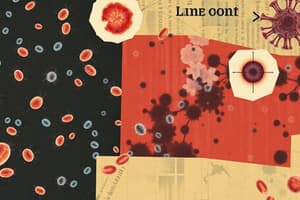Podcast
Questions and Answers
What is the major role of T lymphocytes?
What is the major role of T lymphocytes?
- Activation of complement system
- Cell-mediated immunity against intracellular microbes (correct)
- Antibody production against extracellular microbes
- Regulation of cytokine production
How do some intracellular bacteria and protozoa survive in phagocytes?
How do some intracellular bacteria and protozoa survive in phagocytes?
- They induce apoptosis in phagocytes
- They escape from the phagosome
- They inhibit the release of cytokines
- They resist the microbicidal activities of phagocytes (correct)
What is the role of T cells in infections with intracellular microbes?
What is the role of T cells in infections with intracellular microbes?
- Induce antibody production
- Stimulate macrophages to kill ingested microbes (correct)
- Activate the complement system
- Inhibit phagocytosis
Where do B cells mature?
Where do B cells mature?
What is the function of primary lymphoid organs?
What is the function of primary lymphoid organs?
Which organ is not considered a secondary lymphoid organ?
Which organ is not considered a secondary lymphoid organ?
What is the role of lymphatic vessels?
What is the role of lymphatic vessels?
What happens to the lymph as it travels through lymphatic vessels?
What happens to the lymph as it travels through lymphatic vessels?
Flashcards are hidden until you start studying
Study Notes
T Lymphocytes
- T lymphocytes play a major role in cell-mediated immunity, recognizing and eliminating infected cells and presenting antigens to other immune cells.
Intracellular Microbes
- Some intracellular bacteria and protozoa can survive in phagocytes by preventing phagosome maturation or by escaping into the cytosol.
T Cells and Intracellular Infections
- T cells recognize and eliminate infected cells, producing chemical signals that activate other immune responses to combat intracellular infections.
B Cell Maturation
- B cells mature in the bone marrow.
Primary Lymphoid Organs
- Primary lymphoid organs, such as the bone marrow and thymus, are responsible for the production and maturation of immune cells.
Secondary Lymphoid Organs
- The brain is not considered a secondary lymphoid organ.
Lymphatic Vessels
- Lymphatic vessels transport lymph, a clear fluid containing immune cells, throughout the body, playing a crucial role in the immune response.
Lymphatic System Function
- As lymph travels through lymphatic vessels, it is filtered and immune responses are activated, allowing for the recognition and elimination of pathogens and foreign substances.
Studying That Suits You
Use AI to generate personalized quizzes and flashcards to suit your learning preferences.



